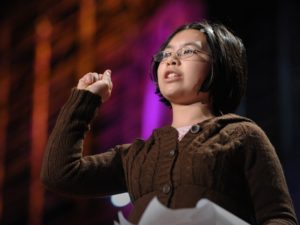Adora Svitak was only 12 years old when she did her TED talk and I have to confess I was pretty surprised when I saw her standing up on stage looking so young and yet so confident. As I’m sure many others did I wondered what it was a 12 year old could have to say that would be worth watching. What had she created? What had she achieved? Later research revealed she had come to national attention at the age of 7 when she was called a ‘tiny literary giant’ by Diane Sawyer on Good Morning America. She had been writing since the age of around 3 – short stories, poems, observations about the world – and later moved her skills into campaigning, becoming an activist for feminism, youth-oriented causes and liberal politics and was the 2011 recipient of the National Education Association Foundation’s Award for Outstanding Service to Public Education. Now at 18 she studies at UC Berkeley, but continues to speak at hundreds of schools, classrooms and conferences around the globe. So her TED talk was probably worth a watch.
The topic of her talk was in fact her youth, and the reality that the majority of people ignore or sideline children’s opinions on account of their age: their ideas and thoughts dismissed as irrelevant because they are ultimately seen as too young to understand the world. We’ve come to use the term ‘childish’ to refer to irrationality, carelessness and ignorance. Of course we value maturity in people, an experience of the world and of people is something to be sought. However this is often to the detriment of remembering the importance of the naive joy children find in the world, something that we lose as we develop ‘rationality’. Kids may be inexperienced but often this means they are not cynical, they do not damn their dreams as illogical or attempt to limit their imaginations. Indeed, we should think on how many things may never have been achieved had rationality not been suspended at least momentarily.
In her talk, Svitak compares adult irrationality seen in wars, colonisation and imperialism in contrast to some of the inspiring works achieved by children such as Anne Frank, Ruby Bridges (one of the first black children to desegregate all-white schools in Louisiana during the 1960s) and more recently Charlie Simpson – who raised £120,000 for Haiti on a sponsored bike ride. The point is that age is no limit to what may be achieved, and indeed a younger age may in fact be a benefit, affording as it does a somewhat more optimistic view, where one is not hemmed in by inhibitions or fears. We are constantly told to be ‘realistic’ and to accept that most things we may dream of probably won’t happen. How many times have we halted a half-formed thought in our minds because we’ve told ourselves it’s impossible? In order to make anything a reality it has to first be dreamed. Svitak here uses an example of the Museum of Glass asking kids to submit ideas for sculptures, and rather than thinking of how difficult it would be to blow glass in a certain way, they simply allowed their imaginations to roam free. The results were unorthodox but original, a bacon man or a broken hearted snake – allowing us to go beyond the typical forms we expect glass to take. As adults we are expected to not allow our imaginations to go to such extents and the result is that we are presented with the same images and ideas again and again. There is a certain fear of dreaming too big – presumably out of our real fear of failure – yet this has led to something of a distrust of youthful optimism and adults thus have a prevalently restrictive attitude towards kids. Rather than allowing children’s minds to thrive they are limited to the prescribed ideas of what should be taught, there is no reciprocal element to schooling as it is assumed that kids have nothing worthwhile to say, while all adults should be taken heed of purely by virtue of their age.
I would however argue that Svitak herself is a very unusual example of the potential wisdom of children; very few 12 year olds would have the capacity or indeed desire to write books. Her talk felt somewhat more like an adult in a child’s body – somehow distant from the other children whose rights she was advocating. The point remains however that our initial response is to dismiss her on account of her youth, and the fact that we are surprised when we find we have learnt something from her goes to show that we expect very little from children. We should not allow age to dictate respect and we should acknowledge that rationality and adherence to the ordinary way of thinking are not always positive things. Speaking and listening to children in the same way we do to our own peers would not only ensure that we’re bringing up a generation who believe their ideas are valid, but we may ourselves learn something: if we only let go of our preconceived notions of knowledge. Svitak is simply proof that age need not be a bar on one’s achievements, and this surely leaves us with a hopeful message that we too may allow ourselves some optimism for our own aspirations.
-Scarlett Evans
Junior Girl
Girl Museum Inc.

